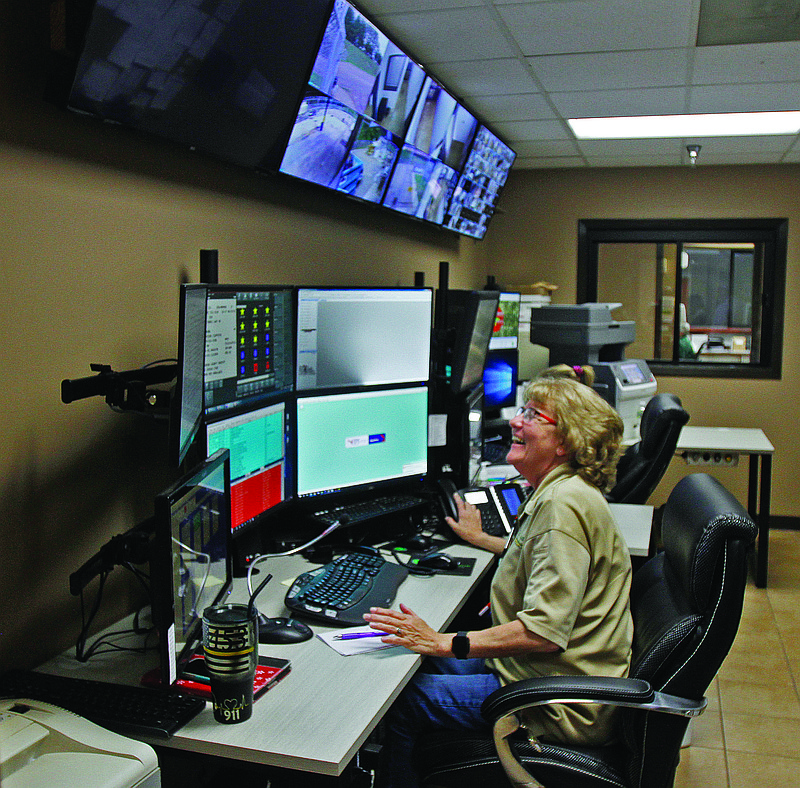The Union County Sheriff’s Office recently purchased new body cameras that deputies are now wearing every day as they perform their regular duties, Sheriff Ricky Roberts said.
Last November, Roberts approached the Union County Quorum Court about entering into a five-year, $217,602.70 contract with Axon Enterprises for new TASERS, body cameras and cloud storage capacity for body cam footage.
The contract was to be paid out in yearly installments averaging about $46,800 each year, and also included a $21,865.20 discount for equipment the UCSO already owned. It was to be funded by commissary sales at the Union County Detention Facility, which the UCSO receives a percentage of. Roberts also noted that the jail wouldn’t raise prices on commissary items to pay for the new equipment.
During his proposal, Roberts noted that Axon Enterprises is the only TASER distributor in Arkansas, and entering into a five-year deal would allow any equipment that broke or malfunctioned to be sent to the company for repair at no additional cost; he explained it in November as a “lease-to-own kind of deal.”
The Quorum Court’s Justices of the Peace unanimously approved the deal, and in the months since, every UCSO deputy has been outfitted with one of the new body cameras, which Roberts said he thinks can put both the public and the police at ease.
“We’re really excited about that. That’s another tool in our tool box, not only to protect our officers, but also to protect our community,” he said. “I know that’s a big thing with justice reform, that we have better equipment to protect our officers and our community.”
While deputies are trained to turn on their body cams any time they interact with the public, Roberts said, the new cameras have the added feature of being programmed to automatically start recording any time a deputy pulls their gun or TASER.
“Every time an officer pulls his gun — draws his gun — it automatically turns his camera on, so we don’t have to worry about ‘he didn’t turn his camera on,’” Roberts said in November.
Additionally, any time a deputy’s camera is recording, a supervisor or dispatch officer can live-stream the video being recorded from their cell phone or the dispatch office.
“The neat thing is, if our officers are out here, and they’re in contact with the community — say a traffic stop or an arrest — of course they always have their body cams on ‘record,’ and we as administrators can sit here live, from my phone — I can sit here and watch them when they’re interacting with the community,” he said.
The technology is also utilized by the El Dorado Police Department, Roberts said, adding that his office has several plans for how to use it to improve community policing in the county.
For one, it will allow dispatchers or supervisors to locate a deputy any time they don’t answer their radio, therefore allowing greater scrutiny of their activities while deputies are on the clock.
It will also permit supervisors to listen in on how deputies interact with the community, and allow for specialized training based on those interactions, Roberts said.
“We just had an arrest warrant that was being served, and today was the first day I really got to see it on my phone, and listening to (the deputy and suspect’s) conversation, it was like I was right there next to them,” he said. “We’ll be able to see and train from what these guys are doing out there; maybe give them some pointers on how they can better talk to somebody or maybe use a better tactic — whatever we can do to use it for training.”
Roberts said it was important to him to invest in the new equipment because of the nationwide push for criminal justice and policing reform. He said he hopes the body cams will help to stop any untoward action by deputies before it happens.
“It’s unreal how technology has evolved with police and mind, and you know, with all this — the George Floyd, and the stuff that that’s been going on — we want to be able to better equip our officers and better train them and get to the point where you don’t make CNN,” he said. “Let’s get it to the point where you can talk to someone. We all make mistakes, but there shouldn’t be any mistake to where you lose your life — him or the officer. So that’s what we’re trying to avoid.”
“We’re trying to make our officers better officers, our community safer, so people will understand that when you get out with a UCSO deputy, you’re on camera,” he added.
Another change recently implemented by the UCSO is the addition of new reading material for inmates at the county jail, which is located in the same building as the Sheriff’s Office and is administrated by the UCSO.
In 2019, the jail began offering tablets, essentially for rent and paid for with commissary funds, to inmates, complete with facial recognition to ensure the inmates’ privacy and access to books, games and the Internet.
Now, inmates can read the daily El Dorado News-Times on the tablets through a bulk subscription deal with the paper and the Sheriff’s Office, as well as classic literature.
“Our inmates are now able to read the News-Times on our tablets that we have,” Roberts said. “They’re also being able to read some books, like some classics — “Gone with the Wind,” stuff like that. So we’re giving them a little to keep their minds a little bit sharper.”
